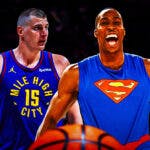Every year, NBA Draftees are outlandishly compared to Hall of Fame players, and often times, don't live up to the unrealistic expectations. But it's not popular for a prospect to be compared to a player who played just 105 NBA games. Nonetheless, Arizona's DeAndre Ayton looks like a Greg Oden clone and is worth the first overall pick.
At 7'1″ and 250lbs, Ayton possesses ideal size for a center. His 7'5″ wingspan is not as impressive as Mohamed Bamba's reported 8″, but it has allowed him to dominate at the collegiate level.
His athletic ability is extremely rare for a player his size. He runs up and down the court nearly as well as a wing player, and is able to keep up with both large, physically imposing centers, as well as smaller, quicker hybrids.
Ayton is well known for his athleticism, but it's amazing to see it in action.
7 footer, 260 lbs, 43.5 inch vert 👀😈 pic.twitter.com/7oJbq2rJDk
— Deandre Ayton (@DeandreAyton) September 26, 2017
For comparison, Andrew Wiggins, known as one of the NBA's most athletic players, has a 44-inch vertical at 6'8″ 202lbs. Ayton is something the NBA has not seen in quite a while. Karl-Anthony Towns is who Ayton is being compared to, but Towns posted a vertical jump of 36.5″. It sounds like hyperbole, but Ayton has a chance to become the most physically dominant center since prime Shaquille O'Neal. Dwight Howard was the league's last athletically premier center, and that was back in 2009. Speaking of Howard, Ayton has known him for a while, and the two took a picture together back in 2015 when Ayton was just 17.
Quick pic with big homie @DwightHoward pic.twitter.com/rkQ87ees0o
— Deandre Ayton (@DeandreAyton) November 22, 2015
Howard is listed at 6'11” 265lbs. If Ayton can fill out his frame, he can become unstoppable. People were saying this same thing about Oden, who was the most highly-touted center prospect since Howard.
During his playing days, Oden stood 7 feet tall and weighed 273 pounds. He was a more violent, powerful player than Ayton is currently, largely due to the NBA at that time; not yet dwarfed by the three-point craze, traditional centers were still held in high regard. Despite the era, Oden's size was still not common. From the moment he was drafted, Oden was a force to be reckoned with. He threw down ferocious dunks, out-rebounded his counterparts, and made game-changing blocks. In the 21 games he played in his second season, Oden averaged 11.1 points, 8.5 rebounds, and 2.3 blocks in just 23.9 minutes per night. Oden was clearly on a path to super-stardom.
And then, disaster struck. After playing 61 games during his first official season after undergoing microfracture surgery on his right knee before his rookie year, Oden fractured his kneecap again and missed the rest of the season.
Oden would not play another game until the 2013-2014 season when he was a reserve for the Miami Heat. He is now gearing up to join Ice Cube's BIG3 league.
Ayton and Oden's stats are relatively similar:
Ayton – 32.9 minutes per game, 19.6 points, 10.9 rebounds, 1.9 blocks
Oden – 28.9 minutes per game, 15.7 points, 9.6 rebounds, 3.3 blocks
Thankfully, Ayton does not have the injury concerns that Oden did coming out of college, knock on wood. Oden was the superior defender by far, and also the more consistent player. Ayton has a tendency to play down to his competition and doesn't give 100% all the time. He is able to get away with it at the collegiate level, due to his vastly superior talent and physical tools. However, this will not work in the NBA. Veterans such as Towns, Howard, and DeMarcus Cousins will school him if he does not give good effort.

While Ayton is able to dominate opposing centers using his power, he is more of a finesse player at this point. He excels at using his length to maneuver around defenders and score inside. But where he really has the advantage over Oden is shooting. Oden never ventured out to the perimeter, but Ayton is shooting a solid 33% from three-point range. For today's NBA, this skill will make Ayton a highly sought after player.
Ayton's superior quickness and athleticism also make him a better perimeter defender; Oden was a classic rim protector, and while Ayton can certainly become that, he has the ability to guard players such as Draymond Green, Anthony Davis, and Kevin Love around the three-point line. He can also switch onto smaller guards, whereas players like Howard are put at a great disadvantage in those situations.

DeAndre Ayton has some advantages over Oden, but he still has a long way to go to match the former Buckeye. If Oden had not suffered his unfortunate injuries, he may very well be dominating the NBA today. With some work, time, and development, perhaps Ayton can become Greg Oden 2.0.




